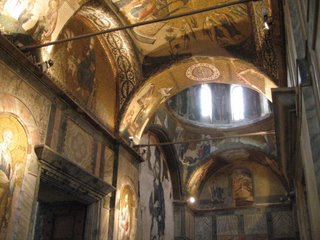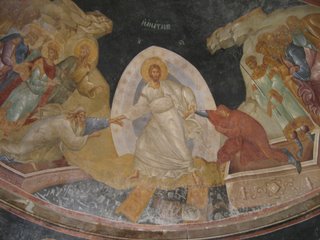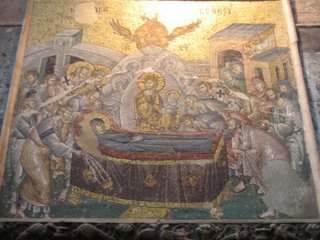
A few days ago, my roommates and I took a day for some adventure around some of the older districts of the city . One of our stops was the Church of St. Savior in Chora ("in the countryside," though it was soon lay within the city walls built by Theodosius c. A.D. 420). The current building dates to the 11th century and is filled with dozens of beautiful, ornate mosaics. A later addition to the church (c. 1320) contains many intriguing frescoes. Two illustrations from the church stood out to me in how they portray Christ.

Anastasis. This fresco depicts the Lord Jesus Christ at the final Resurrection taking Adam and Eve by the hand and drawing them from the grave. I love how Jesus is here the absolute Lord over all things, over the destiny and redemption of humanity. Yet he is not distant; he is personally bringing these two from bondage to decay and into "the freedom of the glory of the children of God" (Romans 8:21). And in the Last Adam giving anew life to the First Adam, we see the truth that redemption in Christ is not a limited phenomenon; rather, he is reconciling the whole world to himself and creating a entirely new humanity (Colossians 1:20). "When this perishable will have put on the imperishable, and this mortality will have put on immortality, then will come about the saying that is written, 'Death is swallowed up in victory' " (1 Corinthians 15:54).

The Dormition of the Virgin. Though probably based more upon tradition than fact or Scripture, this mosaic of the assumption of Mary is an amazing work of art. I'm not exactly sure what all is entailed in the idea of her assumption and being taken into union with her Son and Savior, a few beautiful things are captured here: (1) I think it's a beautiful thing that angels are here at her death, fighting ever still against spiritual powers of evil in service of those who are to inherit salvation (Heb. 1:14). "Precious in the sight of the LORD is the death of His godly ones" (Psalm 116:5).
(2) Jesus is holding an infant representing Mary's soul. I've heard that in Orthodoxy this represents that only upon our death and entrance into the fullness of life in the kingdom are we truly born and come to true life, ever growing in the joyful presence and knowledge of God.
(3) I see the supremacy of Christ in creation here, in that even though he is her Son, he is the one who holds her in his power. Even when Jesus was yet to be born, did he not yet hold Mary's life in his hands? "For by Him all things were created . . . all things have been created through Him and for Him. He is before all things, and in Him all things hold together" (Colossians 1:16-17).
You can see more pictures from our excursion at http://andrewhall.photosite.com. Please e-mail me at drew@aderes.net for a password to see the site.
The way Jesus has called us to love one another really is otherworldly. Everywhere you look in the Gospels and in the rest of the New Testament the word for love is agapē, as opposed to eros. The type of love we're to live in, above all things, "seeketh not her own" (1 Cor. 13:5). It's not obvious to us right off the bat, but how often what we call love has mingled with it at least some measure of seeking some measure of love or self-profit from the beloved: his aid, her affection, his continued friendship. When love seeks a response from the beloved back toward the lover, it goes bankrupt.
When we who go by the name "Christian" aim toward Spiritual love, as Bonhoeffer so often insists, our relations with others must be solely mediated through Jesus Christ, the one who is among us "as the one who serves" (Luke 22:27). That is, it is to live in our freedom from needing to bind ourselves directly to others. Finding ourselves in Christ means that we're already complete (Col. 2:9-10) and now freed for others, serving not ourselves but our Lord and the God whose image they bear.
This is why Jesus teaches us to love our enemies. The normal person would weep over unrequited love, because the enemy will not serve him back or give himself in return. Jesus didn't stop loving his own people after crying, "O Jerusalem, Jerusalem . . . how often I have longed to gather your children together, as a hen gathers her chicks under her wings, but you were not willing" (Luke 13:34). He lived in his divine freedom to serve others.
O Lord, teach us to love. Free us from ourselves and our selfish desires and corrupt motives. Give us eyes to see the truth that "we love because he first loved us," that we are so entirely possessed by God and that we truly possess him as well, lacking nothing, that we can be freed to be your lips, your hands to others. Amen.
Well, it's been six days in Istanbul now, and I must say that I'm pleased with how things are going (a bit of digestive disagreement notwithstanding): if anything, my Turkish has improved, and daily sundries are like old hat. On top of that, I really like my roommates so far. One of them, Ryan, is an even bigger theology geek than I am: he's studied Greek for two semesters and brought along the entire Christian Origins and the Question of God series by N. T. Wright!
Naturally, Ryan, Anthony, and I ended up having an hour-long conversation about the ways the Holy Spirit works within us to renew our wills and desires. Discussion drifted into competing philosophies (if one can even peg Christianity as a "philosophy"; we were talking about spirit-matter dualism) and how "people"* use these to excuse their own sins and keep away from the Lord Christ. But that little spark inside reminded me a lesson I've had to learn from seeing friends drift far away from fellowship with the Lord: If it wasn't entirely for God's faithfulness to me and his powerful sustaining of my own faith, I would've shipwrecked long ago.
It's so easy to wag my finger and shake my head in no small bit of smug condescension at those who reject Jesus or fail to "get it." But if it weren't for God, I'd be no different. Every earnest prayer, every loathing of my sin, every longing for God, every whispered confession of Jesus as Savior, every hope for the life to come--these I owe entirely to God, as he continues to work faith in me.
Sometimes I wonder, Why on earth does he fight so fiercely for me? Why does my Father, like an eagle clutching me within its talons, still keep me and never let me slip?
Listen to me, O house of Jacob,
all the remnant of the house of Israel,
who have been borne by me from before your birth,
carried from the womb;
even to your old age I am he,
and to gray hairs I will carry you.
I have made, and I will bear;
I will carry and will save.
To whom will you liken me and me make equal,
and compare me, that we may be alike?
(Isaiah 46:3-5)
__________________________________
*As if this were only restricted to others and not to the three of us! "Nathan said to David, 'You are the man!' " (2 Sam. 12:7).
A year ago my buddy Ryan said that "the future has a strange way of casually becoming the present." So it goes for me. By this point on Sunday I'll be five hours into my flight to Istanbul via Frankfurt; what was once a three-month summer at home has come and gone. I've enjoyed being home with my parents, following the Tigers, and cycling. With several friends of mine having recently begun their teaching careers, a real part of me wants to be in the classroom right now as well. And I do hope that an amazing job will come along for me next year. (If you know of any middle or high schools with openings in the biology or chemistry realms, I'm your man!)
During my senior year at Michigan State I read through the book of Romans during my spring break trip to Istanbul. My heart sank at the truth that, as regards the vast majority of people in Turkey, "no one understands . . . and the way of peace they have not known" (3:11a; 17). But later in the week I read the following, which lifted my spirits so greatly: "as it is written, 'Those who have never been told of him will see, and those who have never heard will understand' " (15:21, emphases mine). Paul is quoting Isaiah's prophecy regarding the Suffering Servant (Isa. 52:15), as people will come to understand the message of the revelation of God's power ("the arm of the LORD," 53:1). And so again I find it fitting that culminating Psalm 22, which so vividly portrays the suffering Messiah and his triumph through God's deliverance, are equally encouraging words of hope for the gospel message:
All the ends of the earth shall remember
and turn to the LORD,
and all the families of the nations
shall worship before you.
For kingship belongs to the LORD,
and he rules over the nations.
Posterity shall serve him;
it shall be told of the Lord to the coming generation;
they shall come and proclaim his righteousness to a people yet unborn,
that he has done it. (vv. 27-8, 30-1)
Praise God that his grace and the triumph of the gospel in the lives of people from everywhere on the globe is far more stable and sure than the Tigers' hitting.
"Hope does not disappoint, because the love of God has been poured out within our hearts through the Holy Spirit who was given to us. For while we were still helpless, at the right time Christ died for the ungodly." (Romans 5:5-6)
I love my baptism. Or, more accurately, I love the God whose grace is promised me within it. While I was a three-month-old baby still pooping in my diapers, incapable of doing anything morally noble or worthy or virtuous, the baptismal waters upon me sealed his promise to me that he saves me not by how wonderful I am or how free of filth (either that of sin or of the digestive result of last night's milk).
Now I can look back upon that morning at Immanuel Lutheran Church and breathe a sigh of joy and relief. Whenever I'm faced with my fallenness and sin, I need only say to myself, "Andrew, you were baptized and brought into God's family and promised righteousness by faith while you were still a helpless infant. Rest in your Father's love and grace." Amen!
P.S. - My mom made sauteed zucchini tonight while I grilled the Labor Day burgers.
Let it be known: I really like zucchini. My dear mother asked me which meals I'd like to eat before I leave for Turkey and things like barbecued pork and flavorful beers become unobtainable. My votes: bratwurst with sauerkraut, grilled cheese sandwiches and tomato soup (made with milk, of course), and spaghetti with sauteed zucchini. So when dinner is served tonight, I was dismayed to find there was no zucchini.
I was on the verge of becoming a discontented, grumbling Israelite: "The rabble with them began to crave other food, and against the Israelites started wailing and said, 'If only we had meat to eat! We remember the fish we ate in Egypt at no cost--also the cucumbers, melons, leeks, onions and garlic. But now we have lost our appetite; we never have anything but this manna!' " (Numbers 11:4-6). Is it of note that the zucchini's next-of-kin is the cucumber?
How blind I was to the abundance before me: spaghetti with hamburger sauce, garlic bread, salad, milk. But all I saw was no zucchini. This summer--perhaps more than ever before--I've been really irritated by the advertising that makes us think we need some new $30k car or a $300 iPod to be happy or fulfilled. And in a way, I bought into it; though it was manifested in a garden vegetable. How many people depend upon a daily (if they're fortunate) handful of rice or beans? or rummaging through a restaurant's dumpster? Perhaps it was a twisted, blessed weening in disguise when God sent such starvation upon the Israelites that they were forced to cannibalism (see, e.g., Lamentations 2:20; 4:9-10).
O Lord, forgive us. May we not be like the horse or mule, which have no understanding but must be controlled by the bit and bridle of poverty and hunger. Rather, may we live content with all you provide and bless you from grateful hearts for your kindness toward us in Christ Jesus. Amen.


